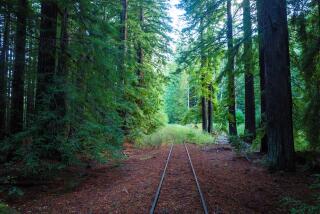IRVINE : Council to Consider Funding for Park
- Share via
The City Council tonight will consider whether Northwood residents should be taxed to build a bicycle and pedestrian trail along a former railroad line.
Proposed property tax increases range from about $80 a year for three years to $40 a year for five years. The tax would raise the $2.3 million needed to lay a meandering concrete trail and add landscaping along a 1.4-mile strip surrounded by Northwood homes.
Groups of residents living behind the 60-foot-wide former railroad line have asked the council within the past few years to build a lighted trail or donate the land to adjacent property owners to discourage transients and drinking teen-agers from using the strip. The council has been looking for ways to build the park ever since voters rejected a city park bond measure in 1990.
The 6:30 p.m. hearing will focus on features of the proposed park and how the city should pay for it.
The council has the authority to increase property taxes without voter approval through a special-assessment or landscape-maintenance district. The council cannot form either taxing district tonight, but could agree to schedule a public hearing to move ahead with one of them.
If the council approves the tax idea, the park could be built as soon as next year or as late as 1998.
Building the park immediately would result in a higher tax--about $81 a year for three years--because the city would have to borrow the money and use the tax to repay the loan with interest. If the city collects the tax money until enough is saved to build the park, overall costs would be less, but the park wouldn’t be built for several years.
The current design plan for the park includes an eight-foot meandering bicycle and pedestrian trail lined with 3 1/2-foot-high ground lights.
Some Northwood residents living behind the path have asked the city to remove the row of old eucalyptus trees along the trail. Residents have said they fear limbs could break off from the trees and fall on passersby and that the mounds of soil around the trees allow people to peek into their back yards.
Clay Martin, the city’s urban forester, and an insect specialist recently examined the trees and declared them healthy and free from infestations.
The city has an 11-year-old policy to preserve eucalyptus trees whenever possible because of their historical value.
More to Read
Sign up for Essential California
The most important California stories and recommendations in your inbox every morning.
You may occasionally receive promotional content from the Los Angeles Times.













